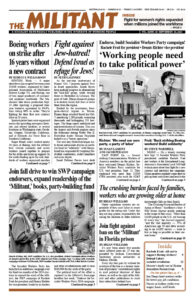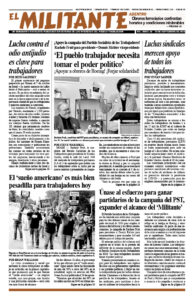Ukrainian forces launched a second incursion into the Russian Federation Sept. 12, 20 miles west of their thrust into the Kursk region five weeks earlier. Ukrainian tanks and troops took the town of Vesoloe, again scatterng poorly prepared and unmotivated Russian conscript defenders.
Their goal is not to oppress local residents, but to force Moscow to divert forces from their latest push in Ukraine’s Donetsk region. And they are having some success, as the Russian rulers have been forced to redeploy forces to try to dislodge Kyiv’s hold on 500 square miles of western Russia. The major Russian operation in Ukraine’s southeast has been disrupted. The morale of defenders of Ukrainian sovereignty has been boosted.
Hundreds of Russian Kursk area residents issued a public appeal asking to be safely evacuated from the war zone. They say Kremlin propaganda about Ukrainian forces there being “completely defeated” is utterly false. Dmitry Kuznetsov, a deputy in Russia’s State Duma, wrote to the Red Cross Sept. 13 calling for an evacuation through Ukraine, then Belarus and then back to Russia. Kyiv has invited the U.N. and the Red Cross “to join humanitarian efforts in the Kursk region.” This is in stark contrast to Moscow’s brutal occupation regimes in southeastern Ukraine and Crimea.
Since May, Russian President Vladimir Putin had pushed his forces, despite heavy and demoralizing losses, to try to take the mining city of Pokrovsk, a logistics hub for Ukraine’s military in the southern Donetsk region. With water and power cut, it has been partially evacuated. Thousands of miners are still there, alternating between digging coal and digging trenches outside the city.
Thousands of Ukrainian reserves have halted the Russian advance on Pokrovsk, Oleksandr Syrskyi, Ukraine’s military commander in chief, told CNN Sept. 5. And, in a surprise counterattack, the Azov Brigade broke Moscow’s siege on the nearby town of Niu-York.
Russian artillery barrages and “meat wave” attacks have slowed as more men and arms are sent to Kursk. The incursion into Russia, Syrskyi noted, also “reduced the threat of an enemy offensive” in Ukraine’s adjacent Sumy and Kharkiv regions.
The Kremlin’s war is devastating the lives of working people in Russia as well as Ukraine. Putin has gambled he can win on Ukraine’s eastern front by throwing Russia’s numerically superior forces against tenacious but outnumbered, outgunned defenses. Their soldiers only advance over the bodies of hundreds of fallen comrades.
Putin needs troops to replace losses
The monthly salary for contract soldiers has been raised, using Moscow’s oil and gas profits, to over 20 times the country’s minimum wage. Their signing bonus equals a year’s pay for many Russians. Still recruitment of fresh volunteers is slowing.
Since Moscow’s 2022 invasion, the war has cost the lives and limbs of well over half a million Russian troops. Each month now the casualty rate is some 31,700 Russian soldiers — double that in 2022-23. These come disproportionately from oppressed nationalities and migrant workers in the Russian Federation, as well as prisoners released for “volunteering.”
Many contract troops now are “alcoholics, homeless people, derelicts, prisoners and others,” a councilman from Krasnoyarsk, Siberia, admitted. Moscow’s 2024 recruitment plan called for over 30,000 new soldiers a month, barely enough to replace losses. Putin decreed Sept. 16 that overall Russian troop numbers be increased by another 180,000.
Many prisoners, lured by the promise of freedom if they survive, signed up for what turned out to be one-way tickets to the front. With falling inmate numbers, prisons in southern Russia are closing, while Putin’s Gulag camps are filled with political prisoners.
Mercenary units in Russia’s Africa Corps are being recalled to Kursk, undermining regimes dependent on Moscow’s backing, from Syria to Burkina Faso. Despite their families’ protests, more teenage draftees find themselves sent to war zones.
Young soldiers who try to desert, surrender or refuse to fight face 15-year prison terms. Russian officers often keep those who disobey orders in cellars without food or water for days. It is these Russian workers and farmers in uniform, and their families and friends back home, who are the best potential allies of Ukrainian working people in the fight against Putin’s war.
The number of desertions is on the rise. An anti-war project in Russia, Get Lost, has assisted over 900 Russian soldiers to abandon their posts. And it has helped over 35,000 young men avoid military service by leaving Russia or finding refuge inside the country.
“My hands are stained with blood,” Denis, a Russian drone operator, told the Moscow Times. Horrified by the slaughter, he deserted and fled abroad for his “own life and freedom,” saying he didn’t care about Putin’s regime.

